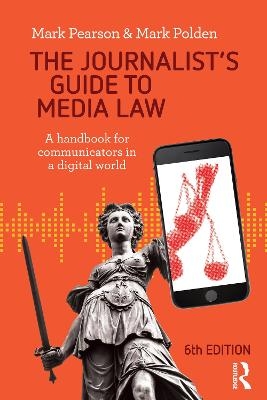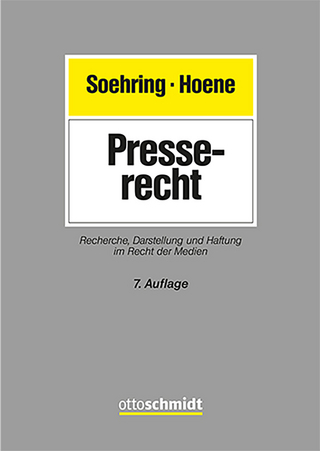
The Journalist's Guide to Media Law
Allen & Unwin (Verlag)
978-1-76029-784-8 (ISBN)
This widely used practical guide to communication law is essential reading for anyone who writes or broadcasts professionally, whether in journalism or strategic communication. It offers a mindful approach to assessing media law risks so practitioners can navigate legal and ethical barriers to publishing in mainstream and social media.
This sixth edition has been substantially revised to reflect recent developments in litigation, and the impact of national security laws and the rising gig economy where graduates might work in the news media, PR, new media start-ups, or as freelancers. It covers defamation, contempt, confidentiality, privacy, trespass, intellectual property, and ethical regulation, as well as the special challenges of commenting on criminal allegations and trials. Recent cases and examples from social media, journalism and public relations are used to illustrate key points and new developments.
Whether you work in a news room, in public relations or marketing, or blog from home, make sure you have The Journalist's Guide to Media Law at your side.
'Whether you're an MSM editor or reporter, a blogger, a tweeter or a personal brand, this book might save your bacon.' - Jonathan Holmes, former ABC Media Watch host
'The leading text book from which most journos learned their law' - Margaret Simons, associate professor in journalism, Monash University
MARK PEARSON (BA, DipEd, MLitt, LLM, PhD) is Professor of Journalism and Social Media at Griffith University in Queensland, where he is a member of the Griffith Centre for Social and Cultural Research. He is author of Blogging and Tweeting Without Getting Sued (Allen & Unwin, 2012) and co-editor of Mindful Journalism and News Ethics in the Digital Era: A Buddhist Approach (with Shelton A. Gunaratne and Sugath Senarath, Routledge, 2015), and Courts and the Media: Challenges in the Era of Digital and Social Media (with Patrick Keyzer and Jane Johnston, Halstead Press, 2012). He has worked as a journalist with several media organisations, including The Australian. He blogs from journlaw.com and tweets from @journlaw. MARK POLDEN is a Sydney barrister. After ten years in the media law practice group of a national law firm, and then as in-house counsel for Fairfax Media for the best part of two decades, he now advises and acts for Australian and international print, broadcast and online media, film and television production houses and for private clients.
PART 1 DIGITAL LEGAL LITERACY
1. Media law in the digital era
2. Free expression and mindful practice
3. The legal system
PART 2 ISSUES IN JUSTICE AND TRANSPARENCY
4. Open justice and freedom of information
5. Contempt of Court
6. Covering court
PART 3 THE MEDIA AND REPUTATIONS
7. Identifying defamation
8. Defending defamation
PART 4 SECRETS, TERROR AND DISCRIMINATION
9. Keeping secrets: Confidentiality and sources
10. Anti-terrorism and hate laws
PART 5 KEY ISSUES FOR THE DIGITAL ERA
11. Intellectual property: Protecting your work and using the work of others
12. Privacy
13. The law of PR, freelancing and media entrepreneurship
Appendix 1: MEAA Code of Ethics
Appendix 2: Australian Press Council Statement of Principles
Index
| Erscheinungsdatum | 08.01.2019 |
|---|---|
| Sprache | englisch |
| Maße | 156 x 234 mm |
| Gewicht | 453 g |
| Themenwelt | Recht / Steuern ► Allgemeines / Lexika |
| Recht / Steuern ► EU / Internationales Recht | |
| Recht / Steuern ► Privatrecht / Bürgerliches Recht ► Medienrecht | |
| Sozialwissenschaften ► Kommunikation / Medien ► Journalistik | |
| Sozialwissenschaften ► Kommunikation / Medien ► Medienwissenschaft | |
| ISBN-10 | 1-76029-784-4 / 1760297844 |
| ISBN-13 | 978-1-76029-784-8 / 9781760297848 |
| Zustand | Neuware |
| Informationen gemäß Produktsicherheitsverordnung (GPSR) | |
| Haben Sie eine Frage zum Produkt? |
aus dem Bereich


